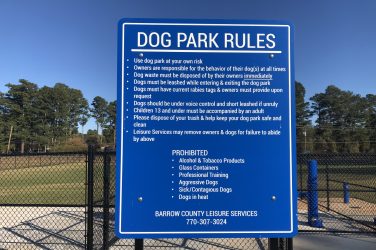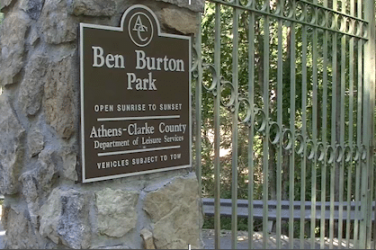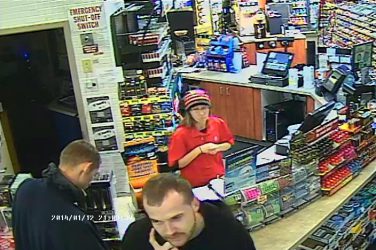Shane Simms, a native of Athens, Ga., moved back to his hometown with the goal to “work good” where he had once “worked bad.”
Simms successfully transitioned from being incarcerated to being a two-time homeowner, as well as a businessman; he now works as a chaplain for the Athens-Clarke County Police Department.
Through his own experiences with the prison system, Simms is able to act as a liaison between local law enforcement and citizens with the hope of fostering a sense of community between the two.
Why It’s Newsworthy: The transition to stable housing for recently released inmates plays a decisive role in their successful reintegration into society. Those who are unable to find stable housing often have problems finding jobs. Simms’ story highlights the different facets of reintegration and the difficulties that former inmates face.
Shaped by Early Childhood
Shane Simms is a native of Athens, Ga., but during the late 1980s, the childhood he knew changed. The crack-cocaine epidemic struck the United States as Simms was coming of age, and Athens was no exception. Even though the epidemic was supposedly over by 1990, Simms said he still saw the effects of it in the years that followed.
An accidental witness to his parents’ drug-use, Simms said it was a catalyst that changed the trajectory of the rest of his life.
“[Seeing] this destroyed everything I believed in, it deprived me of a foundation, deprived me of any sense of direction in life, and of course I didn’t realize this then, but in hindsight, that’s exactly what happened,” he said.
Simms said he was headed down a path accompanied by drug and alcohol use by the age of 14. He recalled eventually taking to the streets of Athens and becoming involved with a group of friends that he felt pressured to fit in with.
“I was kind of torn because of my upbringing, my home training, a lot of the values and norms of the streets were not my values and norms. Nevertheless I felt compelled to fit in to the circumstances, so I found myself living two different lifestyles,” Simms said.
At the age of 18, Simms made the choice to accompany his friends to what became a robbery gone wrong. He was charged with being an accessory to felony murder and armed robbery.
Years later, Simms reflected on the experience. Listen below to hear the story in his own words.
Simms was sentenced to life, plus 15 additional years. He ended up only serving 20 years of that sentence, and was released in 2015.
He began his time at the former Jackson State Prison, and was then moved to Telfair State Prison, which he referred to as the first permanent prison he lived in. He said during that time, it was “one of the roughest prisons in Georgia.” He was transferred two more times, once to Frank Scott State Prison, followed by a move to a prison in Savannah. He then spent his last few years in Johnson State Prison.
This map illustrates the prisons located in the state of Georgia. (Map by Kelsey Russo)
The amount of times he was relocated is not out of the ordinary. While he was transferred every four to five years, Simms said on average, inmates can be moved up to two to three times over a period of a year to a year and a half.
According to Dr. Todd Krohn, a sociology instructor at the University of Georgia with a focus on criminal behavior, prison transfers deprive inmates of the opportunity to form long-term connections and friendships.
“One of the punitive measures that the department of corrections has implemented, not on the book but in practice, is called transport therapy,” Simms said. “It’s pretty much where you get transferred from one prison to another, which deprives your ability to settle down and it plays on the psychology, and that’s actually used as a form of punishment.”
Dr. Sarah Shannon, an assistant professor in the UGA’s Sociology Department agreed, but also recognized the complexity of transfers.
“I have a feeling that it has a lot to do with trying to manage those populations in different ways, and some of it could be intentionally disruptive, but some of it may also have to do with how resources are allocated, changes in administration, changes in deciding this prison is for a certain group of people or not and those kinds of things. So, I have a feeling it’s complicated,” Shannon, a scholar in crime and punishment, explained.
An inmate has no control over where they are placed, Shannon said, which causes disruption to their environment. She also explained this movement not only has an effect on the inmates, but also on their families.
“There’s research showing that access to visitation, in particular in-person visitation, makes a big difference in recidivism rates,” Shannon said.
She continued, “So, if your family member’s incarcerated 50 to 100 miles from where you live, you have difficulties with transportation, it’s expensive, and you’re already struggling, then that can really undermine people; not only people who are incarcerated, but also their families’ ability to maintain that connection with someone that, regardless of what they’ve done, they really care about.”
Returning Home to Athens
Simms’ transition back into society after being removed for two decades was made a little easier due to the fact that he had multiple options for finding a place to live.
“Coming home and having several residences that I could have chosen from was just natural for me. But being out and seeing others that have transitioned back into society, not having a residence and seeing the effect it has played on them and their transition or not, I began to gain an appreciation for housing,” Simms said.
Simms returned to east Athens after his release from prison. He was able to move into the Hallmark Mobile Home Park, where his wife was already a resident.
He then purchased his first home in Arnoldsville, Ga., where he lived for a year before deciding to purchase his second home and relocate back to Athens-Clarke County.
Simms and his wife initially planned on moving to a more wealthy county, but he decided against it because he felt he owed something to his community in Athens.
“I owed something to my community because I felt like over 20 years, I gained a lot of wisdom and experience that I felt could benefit this community, and if I was going to apply my trade so-to-speak anywhere, it was going to be back here in Athens, Georgia,” Simms said.
Life After Prison
Simms went into prison with the drive to endure his sentence and has continued to apply this mindset.
I entered the system with the determination to do one thing, and that was survive. Although I was only 18, maybe 145 pounds soaking wet going into the system, I came in with the determination of a giant.”
Since re-entering, he has become involved with a number of different organizations around the community in an effort to give back.
“I’m honored to have this opportunity to be back in my community, to work good where I had once worked bad,” Simms said.
Simms now serves as the chaplain for the Athens-Clarke County Police Department. Before this, however, he taught a class for graduating cadets in what he described as a “citizen-police relation class.”
Simms said his job was about giving the cadets an idea of what they would face when going into their respective communities, and how to make the adjustments that were necessary for them to be effective at policing those communities.
He was offered the position of chaplain after former police Chief Friedman noticed him and his community involvement.
“[Friedman] felt that my life experiences and what he termed as ‘wisdom’ could benefit not just the community but also our police force as well,” Simms explained.
ACCPD is currently in the process of creating a new role for Simms: Community Outreach Officer. Some of his duties will remain the same, such as reaching out to the community and coordinating different events and meetings.
However, with this new title, Simms will also hold more responsibility for creating relationships between the police and the community. He mentioned ideas like hosting a barbecue, similar to National Night Out Campaign.
Simms has also partnered with Shannon to work with the Athens Reentry Collaborative.
The two of them, along with others in the community, aim to start a conversation about re-entering society after incarceration. Their organization hosts weekly meetings where people gather together to discuss experiences with and concerns about the prison system and re-entering the community.
“It’s really important not only that people who are re-entering make new goals and new decisions about what they want to do, but also that the community receives them back,” Shannon said.
Shannon also noted the importance that housing plays in a formerly incarcerated person’s success in re-entering society, or lack thereof. She said that housing is one of the first issues that comes up in the conversations she has with currently incarcerated individuals.
“If you don’t have a stable place to live, and how to get to and from work, and how to have an income, those things are just so crucial. So, it’s really about that sort of package of stability, having a stable base to operate from,” Shannon said.
A Changing Landscape
How has the physical and communal landscape of Athens changed for a man who had returned after 20 years?
Simms’s perspective on his hometown has been shaped by the trajectory of his life. One of the key differences he notes is in the sense of community, related back to the use of crack-cocaine.
“You found grandparents played a more pivotal role in the lives of the youth because for the most part, they were saving the youth from the destruction of our parents,” he said. “And because of that, I think that there was a bit more unity within the community than now.”
The biggest change Simms said he noticed was the effects the University of Georgia had on the infrastructure of Athens, including the expansion of campus and the building of more roads and bypasses. Alongside that, he’s seen a change in the people.
“Just structurally that was a change, but as far as the people, there seemed to be less motivation, less compassion, less care and concern,” Simms said. “It seemed to have become a more isolated community and after almost three years out. I think it’s not just a local phenomena, but it seems to be a byproduct of over materialization, the explosion of technology, and I think it separated people just in general.”
After returning to the community that raised him, what does housing mean to Shane Simms?
Kelsey Russo, Eliza Castriota, Emma Fordham, Alexandra Travis and Kristen Adaway are seniors majoring in journalism at the University of Georgia.







